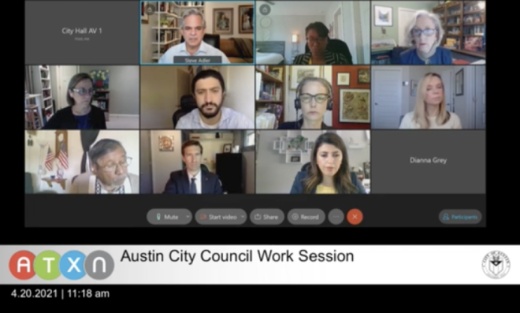COVID-19 rental assistance (Item 16)
Around $29.48 million in funding, mainly provided through the U.S. Department of Treasury Emergency Rental Assistance Program, could be provided to city households affected by COVID-19. Item 16 covers the possible ratification of an agreement between the city and the Austin Housing Authority, distributing the funding for rent, utilities or other housing expenses incurred due to the pandemic between Feb. 15, 2021, and Jan. 15, 2022.
Pulling emergency communications and other non-law enforcement positions out of APD (Items 20 and 53)
Item 20 is headlined by the creation of a new Emergency Communication Department under the supervision of the city manager. Via an ordinance, council could establish the new department by shifting $16.09 million in funding and 222 full-time jobs centered on handling 911 and 311 calls, dispatching police officers to respond to calls for service and liaising with other law enforcement agencies away from APD.
The ordinance would also move several additional positions, ranging from alarm administration to human resources and maintenance from APD to other city departments.
Item 53 would also move regulatory authority of alarm permits and systems from APD to a separate city department. During the discussion of the item in council's April 20 work session, interim police Chief Joseph Chacon told city officials that around 1.2% of alarm calls police respond to end up being break-in incidents, and police and city staff are in the process of analyzing alarms to determine possible false alarm patterns and response process improvements.
"We want to be responsive; APD wants to be responsive if there’s an actual issue to be responded to, but again we also, I think, want to make sure that the building owners that have these alarm systems monitor and operate these alarm systems in a way that doesn't result in false alarms," Assistant City Manager Rey Arellano said.
Revisiting density bonus programs (Item 39)
Council members also moved through an initial discussion of potential revisions to the city's downtown and Rainey Street density bonus program fees April 20. Members generally spoke in favor of moving forward with updating those program details and requested further action on such revisions citywide and capturing fees based on current market conditions in Austin.
"Kicking off the year here for us to just revise the code just as it applies to just the downtown density bonus part of the code, when actually there are so many parts of the city were we’ve received information that we need to update those corridors and those parts of the code to capture fees and affordable housing, I would rather actually fix those corridors and all of those density bonus programs as opposed to just picking this one," District 4 Council Member Greg Casar said.
Further consideration by council April 22 could center on moving forward with the downtown-specific program updates first before tasking city staff with a longer review process for a broader recalibration of the city's density bonus programs.
Education funding and gun violence resolutions (Items 37 and 59)
Council may also appeal to state and federal authorities for assistance and action on separate issues via two resolutions.
Item 37 on the April 22 agenda requests Gov. Greg Abbott, the Texas Legislature and the Texas Education Agency begin distribution of around $18 billion in federal COVID-19 emergency funding aimed at supporting K-12 education.
TEA Commissioner of Education Mike Morath said April 14 that new rounds of funding through the Elementary and Secondary School Emergency Relief Fund have not made their way to local Texas school districts while the state Legislature awaits additional guidance from the federal government.
Item 59, a late addition to council's April 22 agenda, centers on a resolution requesting both state and federal action on gun violence as well as directing City Manager Spencer Cronk to take steps at combating gun violence locally.
The resolution references recent developments such as the killing of three Austinites in an April 18 Northwest Austin shooting incident and the progress of House Bill 1927—allowing permitless carrying of firearms by anyone age 21 and older—in the Texas Legislature.





